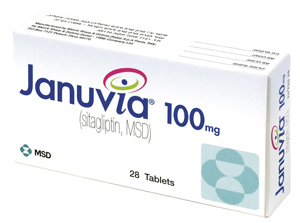Doctor: Januvia Pancreatic Cancer Risks Deserve Further Study
By Anne Bucher
 Januvia (sitagliptin) is a diabetes drug that is manufactured by Merck Pharmaceuticals. It helps to regulate the blood sugar in patients with type 2 diabetes. Januvia belongs to a class of drugs called incretin mimetics, which work by increasing levels of glucagon-like peptide-1. Some doctors fear that increasing this hormone could accelerate precancerous conditions that are already present in a diabetes patient.
Januvia (sitagliptin) is a diabetes drug that is manufactured by Merck Pharmaceuticals. It helps to regulate the blood sugar in patients with type 2 diabetes. Januvia belongs to a class of drugs called incretin mimetics, which work by increasing levels of glucagon-like peptide-1. Some doctors fear that increasing this hormone could accelerate precancerous conditions that are already present in a diabetes patient.
Diabetic Rats That Were Administered Januvia Developed Precancerous Changes to Pancreas
Dr. Peter C. Butler agreed to perform a study about Januvia’s effectiveness on diabetic rats. In 2008, he observed that the rats involved in the study experienced precancerous pancreatic changes. In another of Dr. Butler’s Januvia studies, he evaluated the pancreases of 34 organ donors who had died of causes that were unrelated to pancreatic disease. Of these donors, seven had taken Januvia and one had taken a similar drug called Byetta. The pancreases from these eight donors had more precancerous tissue than non-diabetics or diabetics who had not used incretin mimetics.
Dr. Butler and his follow up studies may threaten the future of diabetic drugs. He is vehemently opposed by powerful drug companies and diabetes specialists who insist that his research is contradicted by other studies. These opponents argue that there is insufficient evidence to link Januvia with pancreatic cancer. If there is any connection, the risk is extremely low.
While Dr. Butler does not recommend that Januvia be taken off the market, he chooses not to prescribe the drug to his own patients. He believes that further study is needed. Specifically, he recommends using MRI scans to find out if Januvia contributes to the enlargement of patients’ pancreases.
Results of New Clinical Trials to Be Released this Summer
Based in part on Dr. Butler’s findings, the U.S. Food & Drug Administration (FDA) has begun to investigate Januvia and similar diabetes drugs to determine whether they increase the risk of patients developing Januvia pancreatic cancer. Results from these clinical trials are expected this summer. The possibility of Januvia increasing the risk of a patient developing pancreatic cancer poses an extreme threat to the drug, as pancreatic cancer is extremely difficult to treat and often kills victims within a year.
Nancy Thornberry, the head of Merck’s diabetes drug development department, says that clinical trials showed no increased risk of Januvia pancreatic cancer. Other scientists who have studied Januvia have determined that there is no conclusive evidence to suggest that Januvia increases the risk of pancreatic cancer.
Merck Faced with an Increasing Number of Januvia Lawsuits
According to Merck, there have been 43 lawsuits filed by plaintiffs who allege that Januvia caused their pancreatic cancer. As the FDA and other agencies continue to study the risk of Januvia pancreatic cancer, the number of lawsuits is likely to increase.
If you or someone you love has developed pancreatic cancer after taking Januvia, you could join the growing number of plaintiffs who have filed Januvia lawsuits against Merck. They allege that Merck failed to adequately warn doctors and patients about the serious health risks associated with Januvia. To learn more about your legal rights, visit the Type 2 Diabetes Drugs Januvia, Byetta Class Action Lawsuit Investigation.
Updated June 4th, 2013
All medical device, dangerous drug and medical class action and lawsuit news updates are listed in the Drug and Medical Device section of Top Class Actions.
Top Class Actions Legal Statement














